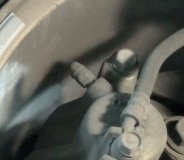Always bench bleed a new master cylinder before installing. To bleed system perform steps below.
PRESSURE BLEEDING
Clean the top of the master cylinder, remove the caps, and attach the pressure bleeding adapter.
Check the pressure bleeder reservoir for correct pressure and fluid level, then open the release valve.
Fasten a bleeder hose to the wheel cylinder bleeder nipple and submerge the free end of the hose in a transparent receptacle. The receptacle should contain enough brake fluid to cover the open end of the hose.
Open the wheel cylinder bleeder nipple and allow the fluid to flow until all bubbles disappear and an uncontaminated flow of fluid exists.
Close the nipple, remove the bleeder hose, and repeat the procedure on the other wheel cylinders or brake calipers.
MANUAL BLEEDING
This method requires two people: one to depress the brake pedal and the other to open the bleeder nipples.
Remove the reservoir caps and fill the reservoir.
Attach a bleeder hose and a clear container as outlined in the pressure bleeding procedure.
Have the assistant depress the brake pedal to the floor several times and then have him hold the pedal to the floor. With the pedal to the floor, open the bleeder nipple until the fluid flow ceases and then close the nipple. Repeat this sequence until there are no more air bubbles in the fluid.
As the air is gradually forced out of the system, it will no longer be possible to force the brake pedal to the floor.
Periodically check the master cylinder for an adequate supply of fluid. Keep the master cylinder reservoir full of fluid to prevent air from entering the system. If the reservoir does run dry during bleeding, it will be necessary to rebleed the entire system.
SPONSORED LINKS
Sunday, January 31st, 2010 AT 12:52 PM




